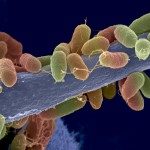Link to Pubmed [PMID] – 15618189
Infect. Immun. 2005 Jan;73(1):494-503
Aspergillus fumigatus causes invasive pulmonary aspergillosis (IPA). This disease is one of the most life-threatening opportunistic infections in immunocompromised patients. The type of immunosuppressive regimen under which IPA occurs has rarely been investigated. In this study, we evaluated various parameters of the innate immune response during the progression of murine IPA induced by the intratracheal administration of A. fumigatus conidia as a function of two immunosuppressive treatments: a corticosteroid and a chemotherapeutic agent. We compared host responses various times after infection in terms of survival, pulmonary production of pro- and anti-inflammatory cytokines, cellular trafficking in the airways, lung injury, respiratory distress, and fungal development. We found that IPA pathogenesis involved predominantly fungal development in mice treated by chemotherapy and an adverse host response in mice treated with a corticosteroid. These previously unrecognized differences should be taken into account in evaluations of the pathogenesis of IPA in animal models.

